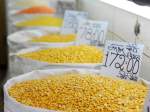You are currently browsing the tag archive for the ‘aata’ tag.
# 85
March 17, 2021
Today’s Hindi proverb (कहावत) is:
गरीबी में आटा गीला।
(Transliteration: Gareebi mein aata geela.)
Literal translation: In poverty, flour wet. (Was) In poverty (already) (and now) the flour is wet.
Figurative meaning: As if the already existing situation was not difficult enough, now another difficulty has been added.
Usage in a sample sentence:
जॉन किसी तरह अपने ट्यूशन फीज़ के पैसे अपने दोस्तों से उधार लिया, लेकिन स्कूल जाते समय किसी ने उसकी जेब काट ली और पैसे चोरी हो गए। बेचारेका गरीबी में आटा गीला हो गया।
(Transliteration: John kisi tarah apne tuition fees ke paise apne doston se udhaar liya, lekin school jaate samay kisi ne uske jeb kaat li aur paise chori ho gaye. Bechareka gareebi mein aata geela ho gaya.)
Translation: John somehow borrowed his tuition fee money from his friends, but on his way to school, someone picked his pocket and the money was stolen. Poor guy, got his flour wet while in poverty.
Origins of the proverb: Wheat flour (aata) is the main ingredient in making Indian flatbread (rotis), which is the staple diet of most of the Hindi-speaking north Indians. The poor man’s subsistence diet is supposed to be dal and roti. To preserve the wheat flour, it must be kept dry in a water-tight container, because once the flour comes in contact with water, it undergoes an irreversible chemical change and it can no longer be preserved. During times of poverty and scarcity, people try their best to keep their flour dry and use it only sparingly. Sometimes, due to an accident or due to heavy rains and flooding, some water might get into the flour-container and thus spoil the flour. Such unfortunate accidents cause additional difficulties in an already impoverished house. So, when you are already in poverty and your flour gets wet, the situation came to be used as a euphemism for additional difficulties piling up on an already difficult situation.
January 23, 2021
Today’s Hindi idiom (मुहावरा) is:
आटे में नमक।
(Transliteration: Aate mein namak.)
Literal translation: Salt in wheat-flour.
Figurative meaning: Almost negligible amount.
Usage in a sample sentence:
600 डॉलर प्रति महीना कोई राहत नहीं देगा। यह तो आटे में नमक के बराबर है।
(Transliteration: Che sau dollar prati mahina koi rahat nahin dega. Yeh toh aate mein namak ke barabar hai.)
Translation: $ 600 a month will not provide any relief. This is equal to salt in flour.
Origins of the idiom: Wheat flour naturally contains no salt. Even when we make rotis with it, the quantity of salt we add to the flour is very, very small. It is an insignificant or negligible amount. It is as good as nothing. This idiom uses that fact to point out and make us communicate with others the insignificance of certain other things, like a ridiculously tiny so-called relief package scheme announced by the government.
January 20, 2021
Today’s Hindi idiom (मुहावरा) is:
आटे दाल का भाव मालूम होना।
(Transliteration: Aate daal ka bhav maloom hona.)
Literal translation: To come to know the prices of wheat-flour and daal.
Figurative meaning: To realize that life is not easy. To become aware of the harsh realities of life.
Usage in a sample sentence:
Hostel में life बहुत easy था। जब मैं अपने own घर में shift हुआ, तब मुझे आटे दाल का भाव मालूम हुआ।
(Transliteration: Hostel mein life bahut easy tha. Jab mai apne own ghar mein shift hua tab mujhe aate daal ka bhaav maloom hua.)
Translation: Life was very easy in the hostel. After I shifted out to my own house, I realized the harsh realities of life.
Origins of the idiom: Roti made out of wheat flour and daal is the staple diet of many people in India. When you go shopping for these basic things, and you have to pay for them, you realize how much each of them actually cost. The person who does not have to buy these things on a regular basis is unaware of the prevailing prices and the difficulty in ensuring that the kitchen is always well stocked. This idiom uses these common simple daily food items while alluding to the other more complicated things that make life difficult.




Recent Comments